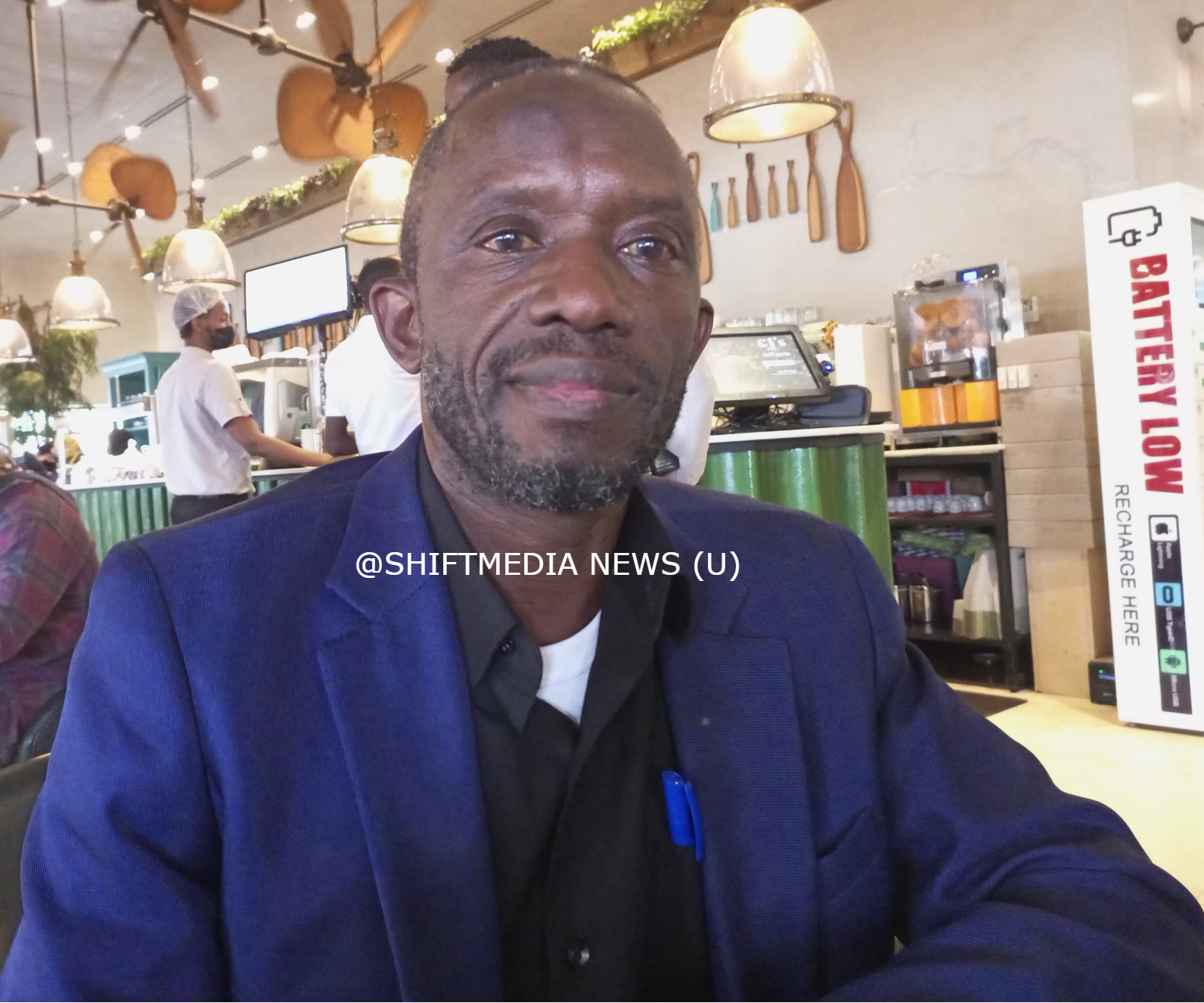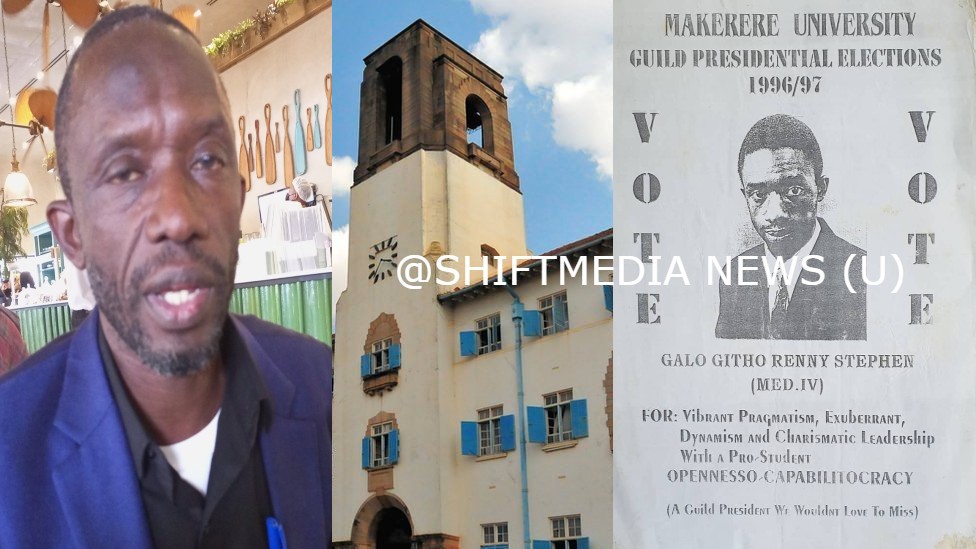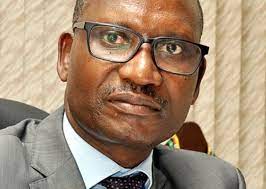TRANSPARENCY: CoST Uganda Commissions 2nd Infrastructure Transparency Index
By PATRICK JARAMOGI
TORORO, Uganda[SHIFTMEDIA] This is a sad tale of how the future of young bright boy from a rural village in Tororo got shuttered after he was mysteriously expelled from Makerere University .
Genesis
Galogitho Renny Stephen is the point of focus today. In October 1996 (26 years ago), just two weeks to complete his degree in Human Medicine from Makerere University, he was slapped with an expulsion. The flamboyant, energetic, student activist, who was also the then Guild President ended his career in snap of a finger.
Despite being a final year student of Medicine, the University Council, the highest decision making body of the institution saw it fit to terminate his career at ease. In short, he had nowhere to appeal what the institution dubbed as a “Summary dismissal.”
What sparked his expulsion?
Around the mid-1990s, there was a move by government to commercialize tertiary education through the introduction of what was dubbed “Cost sharing”. To the students who were on full government sponsorship, Galogitho among them, meant they had to forfeit government allowances, for meals and upkeep among others. This would greatly affect majority of the needy and poor students benefiting from the government scheme.
The students described the move as “unfair and neoliberal”, and protested the move through a peaceful demonstration. Scores of students were immediately expelled, especially the Students’ Guild. But surprisingly, while scores of others who were expelled (Like former Health State Minister and current MP West Budama South Dr. Emmanuel Otaala) were allowed to return and complete their courses, Galogitho wasn’t, something we shall dive deeper into next time.
The Makerere University administration declined to comment on the matter when contacted.
What were the changes about?
The neoliberal structural adjustment programs demanding change in economic sector in the 1990s, redesigned the social and political landscape to a particular economic policy in terms of development.
Liberalization of public service provision changed most profoundly the health and education service from top to bottom. It promoted buying services “Cost Sharing” in tertiary education and health institutions.
According to the students, and others in general, the neoliberal experiments did not serve to reflect, reproduce or strengthen human rights, in turn it instead weakened the social security of the poor and vulnerable.
Who is Galogitho?
Galogitho Renny Stephen grew up from a humble and poor home in Siwa, Nabiyoga sub county in West Budama Central in Tororo district.
A boy among many children, Galogitho was exceptionally bright. Despite the fact that he faced hardships regarding access fees for his education, he stood above the rest. In 1983, he sat for his Primary Seven and excelled scoring aggregate 4.

During the interview
PHOTO/SMN
He was admitted at St Peters College Tororo on bursary. But along the way, while in Senior two, issues arose. The school raised tuition that overshoot his bursary cap. Literally, the parents could not afford, forcing him to drop out of school.
He returned to the village where he resorted to digging and taking care of the animals at home.
Ray of Hope
In 1985 two priests hunted for him and got him in Siwa. They (priests) provided support and took him to St. Pius Seminary in Nagongera. They wanted him to continue with his education and later become a priest.
But Galogitho had much love for St. Peters College Tororo. He was eventually taken back in 1986 and successfully completed his senior 4, again passing with record marks.
He was subsequently admitted at St Marys’ College Kisubi where he did PCB/Mathematics. In 1991 he emerged among the best students in the country. His marks earned him a government scholarship at Makerere University to do Human Medicine. He was among the 24 students who earned this government offer at Makerere.
During the exclusive interview, after 27 years in oblivion, Galogitho said the struggle against this neoliberal tendency started way back when Chairman Norbert Mao , and Hon Emmanuel Dombo were Makerere University Guild Presidents.
Picking up the pieces
In 2008 a ray of hope seemed to shine for Galogitho. A couple (The Leakey’s) from Australia heard about his issue and felt like supporting. He was taken to Nairobi University to complete his degree in medicine. All that the university demanded was a recommendation from Makerere and results for previous years, that Makerere declined to offer. That shattered his hopes further. This left Galogitho so down trodden prompting him to fall into deep depression. He went to Jinja and resorted to teaching at the Holy Cross Secondary school. This didn’t last before he opted to work in some construction sites until he was fished out.
How was he smoked out?
In September 2020 fire gutted the Ivory Tower at Makerere University. A Ugandan Writer and Clinical Medical Officer James William Mugeni based in the USA chose to write memoirs of some landmark events that have occurring in Makerere University over the years. Mugeni remembered and likened the fires to even that happened in October 1996.
He referred to Galogitho who was expelled from Makerere as the “Short Tower” of Makerere.
Through a Face Book account dubbed; “Friends of Galogitho Renny Stephen”, instituted by an eight (8) member steering committee, garnered over 500 friends and followers.
They mobilized towards the restoration of the “Short Tower”. This marked the spontaneous birth of the Social Crusade comprising of people from all walks of life in Uganda, and across the globe.
The Galogitho Social Justice phenomenon has brought people together in the shortest time more than any other single identifiable event in the post- independent history of Uganda.
People of Dipolar political views and groupings have come together to approve and do one thing, united by a common denominator or Equity and Social Justice. Coming together are Doctors, Engineers, Lawyers, Professors, Teachers, Social workers, Businessmen and Women, Priests, Seminarians and former alumni of other Universities.
Rise from the Ashes
Galigitho kept one thing in mind, to forget about the expulsion and start afresh. He is currently pursuing a course in Public Administration after efforts to become a surgeon hit a dead end.
The activities of this Social Formation are geared towards fundraising through platforms to support the rehabilitation and restoration of Galogitho’s life in short, medium and long term.
Land purchased
In just two years, the friends of Galogitho have managed to raise some funds that has enabled him purchase a piece of land in Jinja City.
Pitched on this foundation, the African Institute for Social Justice and Economic Transformation has been reborn as an ultimate center for redress and restoration for individuals, communities, and overall humanity that may befell similar predicament on a macro and micro level in all existential facets as happened to Galogitho, “The Short Tower.”
What it will do
The Institute is missioned to engage with state and stakeholders to reclaim its space in the provision of critical social services of health, education, and social protection.
The advancement of this institute is hinged on the efforts initiated by Githo, then President of Makerere University Student’s Guild in pursuit of social equity, and economic inclusion of the poor and vulnerable people of Uganda and elsewhere.
“I request for donor and community support to enhance our program strategy. I request for partnership with those who can help us build our capacity of our organization, “said Galogitho.
He said the Institute shall be a One Stop Center for Scholarly, Practice and Pragmatic Excellence that generates approaches and enhances skills to Practitioners and informs policy formulation in relation to Social Justice and Economic Transformation.
Tips to Help You Move On.
Students can be expelled by their colleges and Universities for many reasons, including failure to meet academic standards, cheating, plagiarism, alcohol or drug abuse, and criminal activity.
But while being expelled is immensely difficult to cope with, it is not the end of the world.
- Accept Responsibility
- Show Remorse
- Appeal
- Apply for Readmission
- Start new at another university
- Consider taking a gap year
- Consider and alternative path








